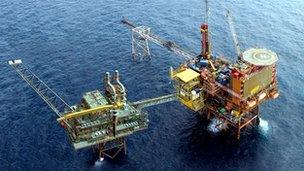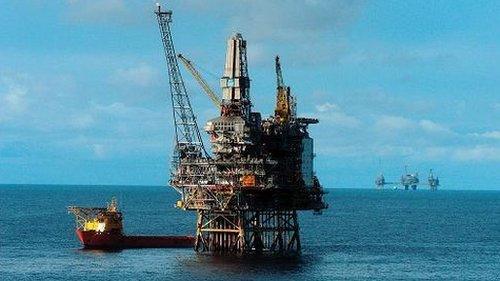Scottish independence: not whether, but how?
- Published

The IFS study looked at what a fall in North Sea oil revenues might mean for an independent Scotland
Ahead of its publication this morning, the Institute for Fiscal Studies assessment of the prospects for Scottish independence was being dismissed as coming from the "too poor, too stupid school of scaremongering".
That's wrong on several counts. One is that it's already being welcomed by the SNP for confirming at least one message the pro-independence side has been highlighting; that Scotland's fiscal position in recent years has been healthier than that of the UK as a whole.
No, hang on, let's correct that: it looks less unhealthy. And that's less unhealthy than a rather sickly fiscal patient.
It's also unfair to the IFS after it produced an admirably balanced report which makes clear that Scotland could handle its public finances if it became independent.
But it asks questions about how it would do so, it poses challenges to an independent Scotland which it says other countries are facing, and it reflects the fact that public finances - in wealthy and poor, oil-rich and resource-starved - have a nasty habit of requiring uncomfortable choices.
To say that Scotland would face a more difficult fiscal position in the medium to long-term is not to say that an independent Scotland could not handle that, but to say that a serious debate is required about HOW it would handle it.
Greek epic deficits
Keen observers of this debate, or readers of this blog, won't find this comes as much of a surprise. The IFS hasn't got any new figures.
It has taken the Government Expenditure and Revenue for Scotland (Gers) data which we already had, and added its own analysis.
The report has assumed Scotland could expect to have the share of offshore oil and gas revenue that comes from Scottish waters. That's roughly 90% of the UK total.
Without that, an independent Scotland would have been facing deficits heading towards 20%, which is overspending on a truly Greek epic scale.
And while that inclusion of hydrocarbon revenue ensures that Scotland looks relatively less unhealthy than the UK as a whole, it is also where the awkward questions come from.
Volatile oil
First, the IFS shows how volatile oil and gas revenue has been; 21% of revenue in 2008-09, down to 12% the following year. In the most recent year for which there are figures, 2010-11, it was at 15% of revenue.
To put it another way, oil revenue in 2010-11 would have been worth £1523 per head in Scotland, but as it was shared out around the UK, it was worth £128 per person.
Oil revenue could have met 48% of public spending requirements in 1984-85. Converted to today's prices, revenue back then peaked around £35bn.
But when the oil price slumped in 1991-92, oil and gas would only have met around 3% of Scottish public spending.
The oil price could slump again, as it has in each decade since the North Sea fields began to flow. But what's more certain is that it will decline in volume. It's already doing so, and rather faster than had been expected.
And while new fields may come on stream, and much remains to be extracted, it's being done so with ever larger tax incentives, and it looks a much less reliable flow of volume and of value for the decades to come.
Balanced budgets
So this is where the IFS has a suggestion which is both attractive and challenging: balance the budget without dependence on oil and gas.
The attraction is that you squirrel away any proceeds from hydrocarbon revenues in a trust fund, as the Norwegians have done with breathtaking success.
The challenge is to balance the budget without it, when it accounts for up to a fifth of public spending. That means either tax increases, spending cuts on health, care and pensions, which are seeing the demographic growth or spending cuts on other services. Or you could make implausibly heroic assumptions about economic growth and a rise in the tax base.
Some popular rhetoric suggests that getting rid of nuclear weapons could solve such problems. But the IFS responds: "Different plausible ways of allocating defence spending would not qualitatively change the overall picture". That is, even if all defence spending were stopped in Scotland, it would get only half way to paying for the Treasury's additional spend in Scotland.
Ageing pressures
There are other important challenges from the IFS to the independence campaign. It points out that confidence in Scottish finances will require clear fiscal rules on constraining deficit and debt. Easily done, but a young country has to work hard to prove it means to stick by such rules.
And until it does, Scotland could find the cost of funding its share of the UK debt (around 75% if gross domestic product, at the point of independence) could be at a significantly higher borrowing rate than the UK currently faces.
And then there's demographic change and rising spending pressures from, for instance, rising expectations of public services and from more expensive medical treatments.
The IFS points out that Scotland's demographics look more challenging than the UK's. That's probably because stronger immigration into England is constraining the growth in the population share of elderly people.
That's just one of the issues to which the Institute of Fiscal Studies intends to return over the next year or so of looking in depth at the prospects for Scottish independence.
It intends to look at oil revenue in more detail, at other spending issues and the demographic pressures, at possible different directions for the welfare state in Scotland, and at ways in which an independent Scotland could have a more efficient and effective tax system than the UK.
The IFS sounds quite enthused about the latter possibility, having found it hard to get the Treasury to take on board its recommendations for tax reform.
But only last week, there was a warning from the Institute of Chartered Accountants in Scotland that the tax powers already agreed for Holyrood don't look like they'll be implemented with anything like the necessary data in place.
These questions are not about making Scotland out to be "too poor, too stupid". But neither the questions nor the answers are simple either.
You can also comment or follow Douglas Fraser on Twitter: @BBCDouglsFraser
- Published19 November 2012
